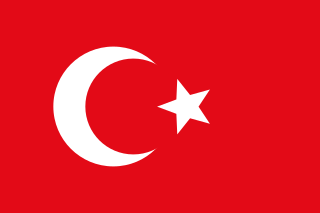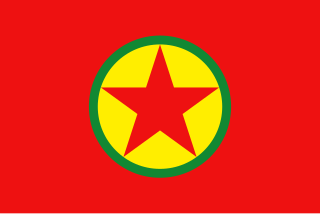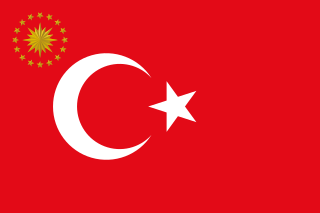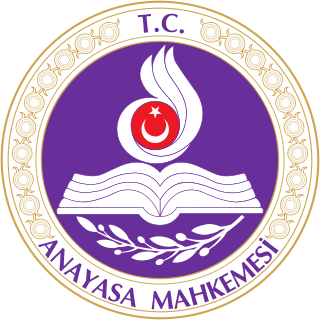
The Ottoman Empire, historically and colloquially known as the Turkish Empire, was an empire centred in Anatolia that controlled much of Southeast Europe, West Asia, and North Africa from the 14th to early 20th centuries; it also controlled parts of southeastern Central Europe between the early 16th and early 18th centuries.

The politics of Turkey take place in the framework of a constitutional republic and presidential system, with various levels and branches of power.

The Kurdistan Workers' Party or PKK is a Kurdish militant political organization and armed guerrilla movement which historically operated throughout Kurdistan but is now primarily based in the mountainous Kurdish-majority regions of southeastern Turkey and northern Iraq. Since 1984, the PKK has been involved in asymmetric warfare in the Kurdish–Turkish conflict. Although the PKK initially sought an independent Kurdish state, in the 1990s its official platform changed to seeking autonomy and increased political and cultural rights for Kurds within Turkey.

The president of Turkey, officially the president of the Republic of Türkiye, is the head of state and head of government of Turkey. The president directs the executive branch of the national government and is the commander-in-chief of the Turkish military. The president also heads the National Security Council.

Recep Tayyip Erdoğan is a Turkish politician who is the 12th and current president of Turkey since 2014. He previously served as the 25th prime minister from 2003 to 2014 as part of the Justice and Development Party (AKP), which he co-founded in 2001. He also served as mayor of Istanbul from 1994 to 1998.

Ahmet Necdet Sezer is a Turkish statesman and judge who served as the tenth president of Turkey from 2000 to 2007. Previously, he was president of the Constitutional Court of Turkey from January 1998 to May 2000. The Grand National Assembly of Turkey elected Sezer as president in 2000 after Süleyman Demirel's seven-year term expired. He was succeeded by Abdullah Gül in 2007.

The Welfare Party was an Islamist political party in Turkey. It was founded by Ali Türkmen, Ahmet Tekdal, and Necmettin Erbakan in Ankara in 1983 as heir to two earlier parties, National Order Party (MNP) and National Salvation Party (MSP), which were banned from politics. The RP participated in mayoral elections at that time and won in three cities Konya, Şanlıurfa, and Van. Their vote percentage was approximately 5%.

Virtue Party was an Islamist political party established on 17 December 1997 in Turkey. It was found unconstitutional by the Constitutional Court and then banned on 22 June 2001 for violating the secularist articles of the Constitution. After the party's ban, the party MPs founded two sections of parties: reformist Justice and Development Party (AKP), headed by Recep Tayyip Erdoğan, and traditionalist Felicity Party (SP), headed by Recai Kutan.

The Politics of Northern Cyprus takes place in a framework of a semi-presidential representative democratic republic, whereby the president is head of state and the prime minister is the head of government, and of a multi-party system. Executive power is exercised by the government. Legislative power is vested in both the government and the Assembly of the Republic. The judiciary is independent of the executive and the legislature.

The judicial system of Turkey is defined by Articles 138 to 160 of the Constitution of Turkey.

The Government of Turkey is the national government of Turkey. It is governed as a unitary state under a presidential representative democracy and a constitutional republic within a pluriform multi-party system. The term government can mean either the collective set of institutions or specifically the Cabinet.

Lesbian, gay, bisexual, transgender, and queer (LGBTQ) people in Turkey face legal challenges not experienced by non-LGBTQ residents, though the overall situation is considered to be less repressive when compared to most other Muslim-majority countries.

The Constitutional Court of Turkey is the highest legal body for constitutional review in Turkey. It "examines the constitutionality, in respect of both form and substance, of laws, decrees having the force of law, and the Rules of Procedure of the Turkish Grand National Assembly". If necessary, it also functions as the Supreme Criminal Court to hear any cases raised about the President, Vice President, members of the Cabinet, or judges of the high courts. In addition to those functions, it examines individual applications on the grounds that one of the fundamental rights and freedoms within the scope of the European Convention on Human Rights which are guaranteed by the Constitution has been violated by public authorities.

The Court of Cassation, officially called the Supreme Court of Appeals of the Republic of Turkey, is the last instance for reviewing verdicts given by courts of criminal and civil justice in Turkey.

Turkey, officially the Republic of Türkiye, is a country mainly located in Anatolia in West Asia, with a smaller part called East Thrace in Southeast Europe. It borders the Black Sea to the north; Georgia, Armenia, Azerbaijan, and Iran to the east; Iraq, Syria, and the Mediterranean Sea to the south; and the Aegean Sea, Greece, and Bulgaria to the west. Turkey is home to over 85 million people; most are ethnic Turks, while ethnic Kurds are the largest ethnic minority. Officially a secular state, Turkey has a Muslim-majority population. Ankara is Turkey's capital and second-largest city, while Istanbul is its largest city and economic and financial center, as well as the largest city in Europe. Other major cities include İzmir, Bursa, and Antalya.

The following outline is provided as an overview of and topical guide to Turkey:
A Turkish name consists of an ad or an isim and a soyadı or soyisim (surname). Turkish names exist in a "full name" format. While there is only one soyadı (surname) in the full name there may be more than one ad. Married women may carry both their maiden and husband's surnames. The soyadı is written as the last element of the full name, after all given names.
The 2011 Turkish sports corruption scandal was an investigation about match fixing, incentive premium, bribery, establishing a criminal organization, organized crime and intimidation in Turkey's top two association football divisions, the Süper Lig and First League.
The Court of Jurisdictional Disputes is one of the four higher courts in the Republic of Turkey. It is tasked with disputes between civil and administrative courts concerning their jurisdiction and judgments. Before the abolishment of military courts in 2017, the court also looked at the disputes involving the military courts.













